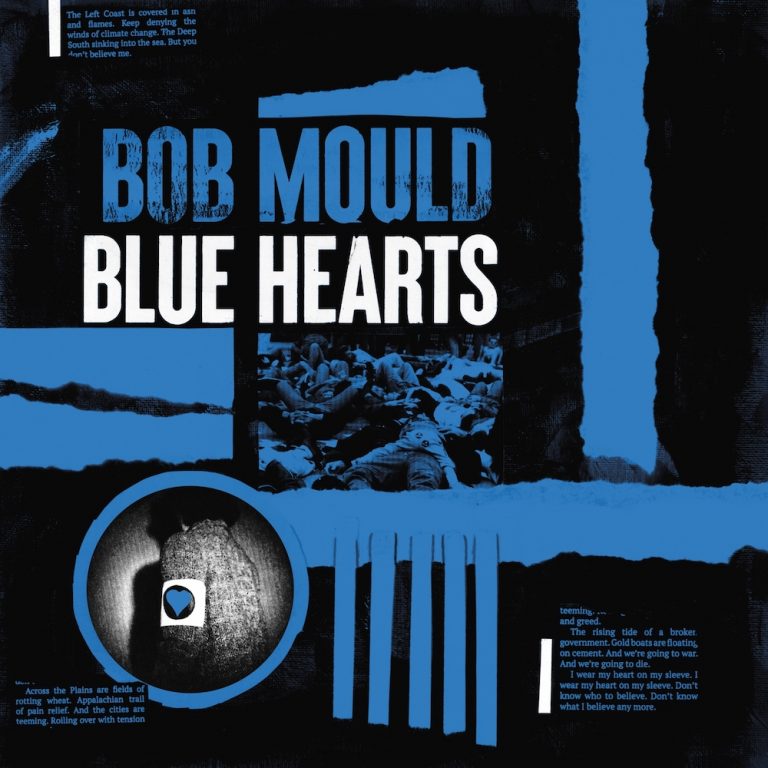Leave it to a rock veteran to set the record straight: this isn’t the first time a President has let a public health crisis go unchecked. It took President Ronald Raegan four years to say AIDS in public – finally, in September 1985 – after health experts first became aware of the disease. Between then, public stigma was abounding and exacerbated by members of his administration. Federal funding for AIDS research was choked. By the time funding was approved in 1985, thousands had died.
So should listeners be surprised when Bob Mould opens the single “American Crisis” with a scathing scream? Not at all. He was a first-hand witness to the AIDS epidemic during his Hüsker Dü years, and he sees parallels to the shit show that is 2020.
Never have the targets of Mould’s lyrics been so defined, and his rage so palpable, as on Blue Hearts. Acoustic opener “Heart On My Sleeve” acts as a Trojan horse: Mould’s despair over climate change (“The Left Coast is covered in ash and flames”) is deceptively restrained. It’s also the quietest opener to a Mould album, giving the listener the sense that he might dial down at least some of his endless energy.
Yet that facade is ripped to shreds on the second track “Next Generation”, an urgent anthem that’s a call to action to “Take to the streets for your rights.” Mould describes Blue Hearts as “the catchiest batch of protest songs I’ve ever written in one sitting.” This is true. Punk-adjacent ragers like “Next Generation” and “Fireball” succeed because they’re rougher and more real than Mould’s more recent work. “Here’s the newest American crisis / Thanks to Evangelical ISIS,” he sings on “American Crisis”. These words come from a place of true rage because there’s so much to be angry about.
For some, Mould’s lyrics might seem a bit too on-the-nose, but there are several moments where political rage is hidden in songs about relationships and internal struggle – a testament that the personal is, in fact, political. Exhibit A: single “Siberian Butterfly”: “You can’t see me, you can’t feel me / You can’t catch me, you can’t touch me,” he sings, a perfect encapsulation that doubles as a stream of consciousness of what it feels to be among the marginalized.
Mould doesn’t stop there. “Racing to the End”, which features some of his fastest shredding on the album, describes the economic disparity that’s taken Mould’s neighborhood. He ups the ante on the grungy “Leather Dreams”, describing a sexual encounter in graphic detail (“You dressed as a cowboy / I was a jock”) and uses the jargon of the gay community (“Tops and their bottoms / condoms and PrEP”). This is, of course, intentional: these experiences are his and worthy of sharing.
Together with longtime bandmates Jason Narducy (bass) and Jon Wurster (drums), Mould has created his strongest album since 2012’s Silver Age. Their chemistry soars on the wild tracks “When You Left” and “Racing to the End” as much as on the somber closer “The Ocean”. Blue Hearts also contains everything we’ve come to expect from a Mould album, regardless of era. “Everyth!ng to You” aims for the emotional heights reached on Sugar songs like “Hoover Dam”. “Forecast of Rain” feels like an ominous update to Mould’s classic “See A Little Light”, where the song’s melodies more closely reflect the lyrics’ skepticism toward religion.
Funny thing: “American Crisis” was written during the Sunshine Rock sessions, but was decided not to be a good fit for the album. Fortunately, the track has found a home here. And while it’s easy to lament the environment from which Blue Hearts has come, Mould demands more. He reminds listeners that everybody has a voice. Use them.

